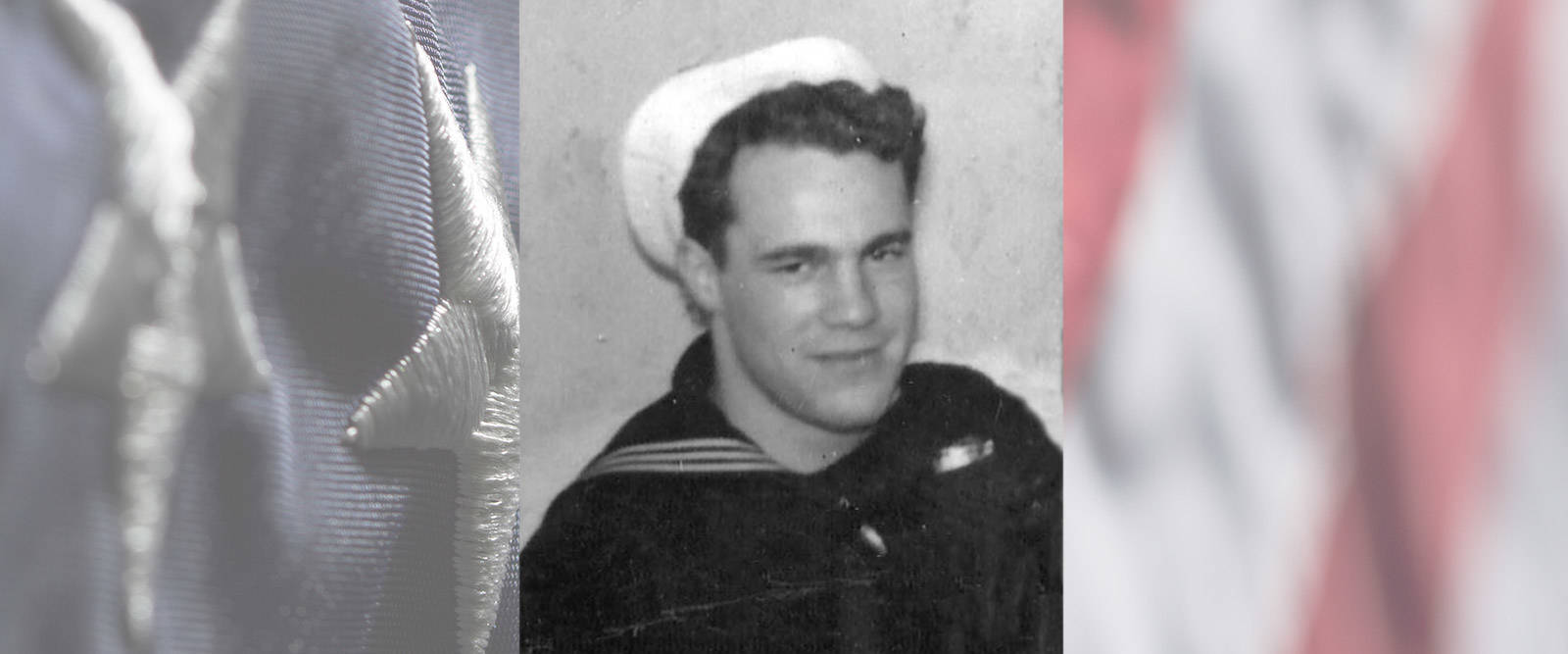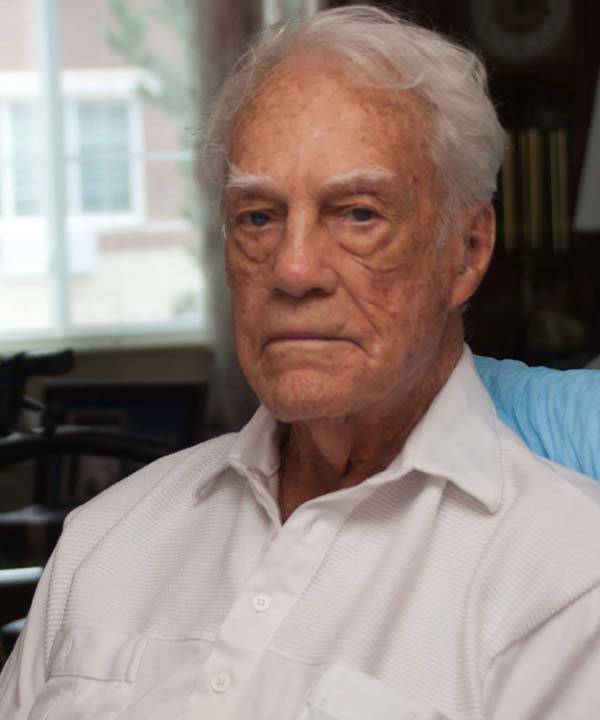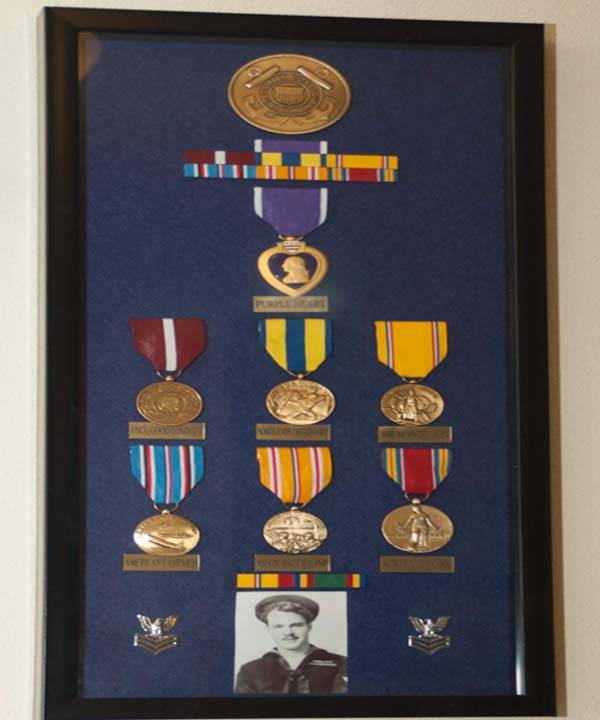U.S. Coast Guard World War II Romeoville, IL Flight date: 08/08/18
By Andrew Dunning, Honor Flight Chicago Veteran Interviews Volunteer
Purple Heart recipient and World War II veteran Otto W. Soyk never expected to find himself operating a 22mm canon as Japanese bombers attacked his ship. Yet, on Sept. 25, 1943, the ships cook first class found himself enmeshed in the U.S. Coast Guard’s worst disaster of the war, fighting to save the USS LST-167 moments after the transport ship delivered a company of Marines to the beach during the Battle of Vella Lavella.
“I joined the Coast Guard because I wanted to save people, not kill them,” Otto says. “That’s why I felt the Coast Guard was the best fit.”
Taking part in an Allied campaign to drive Japanese forces from the Solomon Islands, the USS LST-167, a 327-foot flat bottom tank transport ship, was tasked with transporting Marines from Guadalcanal to Vella Lavella, an island on the western edge of the Solomon Islands. Otto was working in the kitchen when the alarm for general quarters sounded, signaling all men to take up a battle station, he says. Otto took his post at a cannon stationed on the port side of the ship. “I didn’t know anything about this gun, but I knew enough to pull the trigger.”
All the Marines were off the boat when the lookout started yelling, and Otto saw the bombers bearing down on them. “The mood was solemn, but we didn’t fear death,” he says. “We were probably all too young for that. But we were there, so we knew we were gonna do it.”
According to Otto, the transport took two direct hits. The explosions ignited a fire aboard which forced the men to quickly evacuate. “The ship shook violently and shrapnel went everywhere. I could see the dead bodies all over.”
Shrapnel struck Otto on his back, embedding so deeply into his flesh that some still remains today. His fellow Guardsmen carried him off the ship, across the beach and into the jungle, where a corpsman stabilized him, he says. Otto was transferred to a naval base on Guadalcanal and then on to a hospital in New Zealand. Ten Guardsmen were killed in the attack, and 20 others were wounded. The badly damaged ship was towed to a nearby island where it was declared unsalvageable. (“LST-167” accessed July 26, 2018 https://www.cgemf.org/fallen/lst-167). Otto was recovering in the hospital when he received the Purple Heart, without ceremony. “I was laying in bed when an officer walked in and threw the medal at me. He said, ‘here’s your Purple Heart.’ That was it.” When his recovery allowed him to leave the hospital, Otto received orders to report to Michigan, where he would travel around selling war bonds for the remainder of his service.
Otto was born in Chicago, one of Otto and Dorothy Soyk’s eight children. Soon after, his family built a home in South Suburban Midlothian. All of his four brothers served in the military, and he was especially proud of his brother, Wilbur, who served in the U.S. Army and participated in eight major engagements. Another brother served in the U.S. Navy during the Korean War.
Otto attended Tilden Tech High School for just two years, although he would go back and graduate in 1958. He left school to work for the Civilian Conservation Corps. “Times were pretty tough,” he says, and he wanted to contribute to the family’s finances. Nicknamed “Roosevelt’s Tree Army,” the agency was formed in 1933 by President Franklin D. Roosevelt to give jobs to young, unemployed men during the Great Depression while also building and maintaining the country’s national forests.
When he turned 18, Otto decided he needed a new vocation, and with the U.S. poised to join the fight in WWII, he enlisted in the Coast Guard. He entered Basic Training at Coast Guard Training Station, Ellis Island, New York. Otto learned military doctrine and procedures, knot tying, and vessel operations. After graduation, he attended Cooking and Baking school in New York, and for his first assignment he cooked aboard a Relief Light Vessel (LV) at Cornfield Point, CT. The ship featured a “very large light” used to help steer ships in inclement weather. Later, he joined the crew of a 60 foot rescue boat that patrolled the Eastern Seaboard. That same year, President Roosevelt put the Coast Guard under the control of the Navy in order to prepare for combat.
While home on leave, Otto met his future wife, Betsy. His brother and his brother’s wife had just welcomed a new baby, and Otto paid them a visit. Betsy was the wife’s sister, who also visited that day. The two hit it off, and during a future visit, the couple decided their future. “I was only there for a short leave, and we talked about getting married,” Otto says. “So, we went to preacher’s house that day and got married. The next day I was headed back to sea.”
When Otto returned from leave, the Coast Guard ordered him to join the crew of LST-167. Despite being built to transport tanks, they only transported personnel. The ship featured large doors on its bow which opened forward so tanks could easily roll off, which was just as functional for troops, he says. The ship sailed to its destination in the South Pacific, and despite the seriousness of their task, Otto says the journey had its good moments. “We visited some very nice islands like the Solomon Islands and American Samoa.”
In 1945 Otto was honorably discharged at the rank of Petty Officer 1st Class. Next, he returned to Chicago where he found a job with Derby Foods, the makers of Peter Pan Peanut Butter. The couple bought a home in Midlothian where they raised a family. Otto joined the neighborhood’s VFW post and was actively involved in the construction of the post’s building. On the job, he rose to operations manager, serving 37 years with the company.
He retired in 1983, and the couple traveled extensively through Europe, Australia, and New Zealand, where he recovered from his injuries. The hospital had been torn down by that time, he says. In 1994 Otto and Betsy moved to Sebring, FL. He remained active in various veterans groups, even serving as post commander at the Military Order of the Purple Heart. Betsy passed away in April 2016 after 74 years of marriage. Otto now lives in Romeoville and looks forward to his Honor Flight.
We are thankful for your service, Otto, and wish you a very wonderful Honor Flight.





